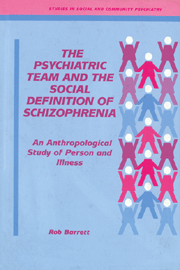 The Psychiatric Team and the Social Definition of Schizophrenia
The Psychiatric Team and the Social Definition of Schizophrenia Book contents
- Frontmatter
- Dedication
- Contents
- Foreword
- Preface
- Acknowledgements
- 1 Schizophrenia in Context
- 2 Time and Space in a Progressive Psychiatric Hospital
- 3 Professional Domains and the Dimensions of a Case
- 4 Clinical Teams and the ‘Whole Person’
- 5 Documenting a Case: The Written Construction of Schizophrenia
- 6 Moral Trajectories: From Acute Psychosis to ‘Chronic Schizophrenic’
- 7 Historical Formulations of Schizophrenia: Degeneration and Disintegration
- 8 Contemporary Formulations of Schizophrenia: Explaining the Inexplicable
- 9 Schizophrenia for Practical Purposes
- 10 The Person, the Case, and Schizophrenia
- References
- Index
9 - Schizophrenia for Practical Purposes
Published online by Cambridge University Press: 05 August 2016
- Frontmatter
- Dedication
- Contents
- Foreword
- Preface
- Acknowledgements
- 1 Schizophrenia in Context
- 2 Time and Space in a Progressive Psychiatric Hospital
- 3 Professional Domains and the Dimensions of a Case
- 4 Clinical Teams and the ‘Whole Person’
- 5 Documenting a Case: The Written Construction of Schizophrenia
- 6 Moral Trajectories: From Acute Psychosis to ‘Chronic Schizophrenic’
- 7 Historical Formulations of Schizophrenia: Degeneration and Disintegration
- 8 Contemporary Formulations of Schizophrenia: Explaining the Inexplicable
- 9 Schizophrenia for Practical Purposes
- 10 The Person, the Case, and Schizophrenia
- References
- Index
Summary
Irrespective of the status of current theories and whether there is sufficient evidence to prove them, schizophrenia finds its principal use in psychiatry as a working concept that is good enough, more or less, for practical purposes. This chapter looks at schizophrenia as a pragmatic category by studying how the patients and staff of Ridgehaven Hospital talked about the illness in their day-to-day interactions with each other. It forms an ethnographic coda to the previous chapters, examining how people drew on myriad sources—theoretical perspectives, lay understandings, underlying cultural metaphors—to negotiate with each other what schizophrenia meant. The analysis is based on data I recorded during the course of an education programme in which the staff taught patients about schizophrenia. Although not the only opportunity for patients and staff to discuss psychiatric illness, it was a setting in which a team of professionals worked together with patients and in which differing definitions of schizophrenia were aired. The staff oscillated between the biological and the psychosocial approaches within an encompassing bio-psycho- social framework. Biologically speaking, schizophrenia was seen as an entity located in the patient's body but separate from his or her self. It was also portrayed as a set of ideas and actions for which the patient was not held responsible. Psychosocially speaking, schizophrenia was reintegrated with the person and relocated within the patient's sphere of responsibility. Patients contributed actively, partly embracing and partly rejecting the representations of schizophrenia put forward by the staff.
Education programme: structure of the course, its curriculum, and teaching styles
The education programme was developed at a time when the scope of the Schizophrenia Team was expanding to offer a more comprehensive range of services. At the suggestion of the Team Leader, a psychiatrist whom I have called Dr Guthrie set up a multidisciplinary education team, inviting interested clinicians from each profession to participate. The most enthusiastic response to this invitation came from a group of psychiatric nurses who worked in the subacute ward, Forest House, which I have previously described as a setting in which team principles and psychiatric hegemony gave way to ward principles and nursing dominance. Independently of the psychiatrists and social workers on the Team, nurses in Forest House already ran a rehabilitation programme for chronic patients that had a psychotherapeutic orientation, chiefly comprising group therapy techniques that involved role-playing, assertiveness training, and specific exercises to build self-esteem.
- Type
- Chapter
- Information
- The Psychiatric Team and the Social Definition of SchizophreniaAn Anthropological Study of Person and Illness, pp. 255 - 271Publisher: Cambridge University PressPrint publication year: 1996
